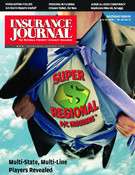When the dust settled at the end of the 2008 legislative session, Florida lawmakers had presented their governor with a full plate of insurance issues, the most significant of which is a bill including a rate-freeze extension for state-run Citizens Property Insurance Corp. policyholders until January 2010.
The measures contained in the Citizens bill (HB 2860) are good news for the 1.2 million Citizens’ homeowners policyholders whose premiums in some cases are already below private market rates. It does not bode so well for privately insured homeowners and auto owners across the state when the next catastrophic event occurs, according to insurer groups that claim assessments on personal policies will run wide and deep.
“Citizens is getting deeper in the hole,” said Sam Miller, vice president of the Florida Insurance Council, an industry group, earlier this month when the bill passed the House and Senate. “They clearly don’t have the money now to pay its claims if we have a hurricane.”
Lawmakers believe taking that risk serves the public interest at this time. “We’ve made a conscious decision to accept the risk,” said Senator Jeff Atwater, R-North Palm Beach.
While Citizens high risk policyholders will be assessed first, there is a possibility, depending on the economic severity of any catastrophes, that privately insured consumers will also face assessments. The new legislation raises from 10 percent to 15 percent the assessment on Citizens’ high risk account policyholders and lowers assessments on privately insured policyholders from 10 percent to 6 percent.
When Gov. Charlie Crist signed the legislation continuing Citizens rate freeze, he also validated an increase from $1 million to $2 million in the maximum value of homes that Citizens can insure.
Citizens spokesman John Kuczwanski said the state-backed insurer is financially better off now than it was after the devastating 2004 and 2005 hurricane seasons, but added that the rate freeze inevitably affects the corporation’s bottom line.
Incentive Veto
Crist vetoed a section of the legislation that would have required Citizens to pay $250 million for the Insurance Capital Buildup Incentive Program, which provides funding to new or existing residential property insurers.
“While I believe the program is well intended and has had the net effect of removing nearly 200,000 policies from Citizens and has kept an additional estimated 480,000 policies out of Citizens, the funding source is inappropriate,” Crist said.
The funding for the program came from general revenues during the 2005/2006 fiscal year, however the additional funding in this legislation would have come from premiums paid to Citizens.
Crist countered the Florida Insurance Council by noting that this funding would have depleted funds available to pay claims and substantially increased the likelihood of assessments for Floridians across the state.
Scott Wallace, Citizens president and executive director, maintained that Crist’s veto of the $250 million section confirms that Citizens’ surplus will only be used for its intended purpose – to pay policyholder claims.
The law also hikes fines for insurance carriers caught violating state rules and revises the rate approval process to bar insurers from implementing rate changes while their filings are still under review by the state’s Office of Insurance Regulation.
Florida Chief Financial Officer Alex Sink expressed concern over raising the maximum home value that Citizens can cover. She said the scenario places additional risk on the state.
Sink also warned about the potential for a dramatic price spike for Citizens’ policyholders once the moratorium on its rates expires in 2010.
Topics Carriers Legislation Florida
Was this article valuable?
Here are more articles you may enjoy.


 Allstate CEO Wilson Takes on Affordability Issue During Earnings Call
Allstate CEO Wilson Takes on Affordability Issue During Earnings Call  Lawyer for Prominent Texas Law Firm Among Victims ID’d in Maine Plane Crash
Lawyer for Prominent Texas Law Firm Among Victims ID’d in Maine Plane Crash  Florida Senate President Says No Major Insurance Changes This Year
Florida Senate President Says No Major Insurance Changes This Year  Beazley Agrees to Zurich’s Sweetened £8 Billion Takeover Bid
Beazley Agrees to Zurich’s Sweetened £8 Billion Takeover Bid 


